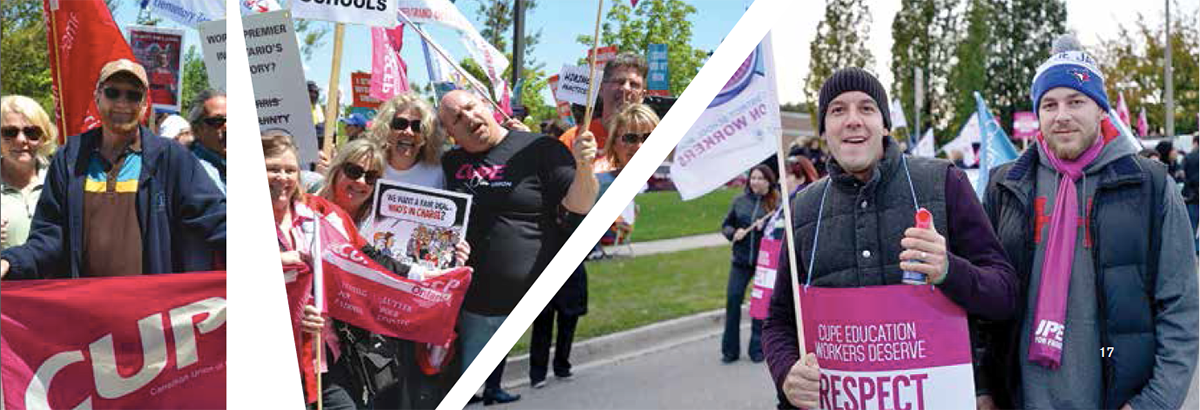Bargaining remained busy and challenging for CUPE members in 2015. Our locals are the first line of defence in protecting good jobs and public services from austerity budgets. We are facing down government attacks on our rights, employer efforts to gut our contracts, and the rise of precarious work.
In 2015, CUPE locals settled 445 contracts at the bargaining table. Our members are still bargaining 1,901 collective agreements, and another 656 will open for negotiations in 2016.

We continue to face legislative attacks on our rights including in Nova Scotia, where CUPE is fighting a bill that strips 75,000 public sector workers of their bargaining rights. The Liberal government used a rare around-the-clock legislative session to push Bill 148 through before Christmas. The bill aims to dictate wages by taking away workers’ rights to free collective bargaining, and to arbitration. CUPE and our allies are planning to challenge the bill, arguing it violates the Charter of Rights.
One of our biggest mobilizations and job actions was in support of negotiations for 55,000 Ontario school board members – CUPE’s largest bargaining table. Members were negotiating for the first time under a provincial law mandating tandem central and local bargaining tables.
Beginning early in the year with province-wide strike votes that resulted in a 93 per cent mandate, education workers moved through a tough round of negotiations with the advantage of a mobilized membership. They spent much of the year raising the profile of their work in local communities. By summer’s end, when it became clear stepped-up job action was necessary, they rolled out a province-wide work-to-rule job action that made an impact.
CUPE successfully fought an illegal strike application filed by an Ontario school board, and won a crucial labour board case for the Ontario school board sector, setting a precedent affirming the right of CUPE members to work to rule or go on strike in support of central bargaining. The central bargaining committee successfully concluded negotiations without moving to full strike action, and handed off local bargaining to well-prepared committees, armed with coordinated language.
We are the first line of defence in protecting good jobs and public services.
The other major bargaining mobilization was in Quebec, where CUPE health care, social services and education members are part of provincial bargaining that unites more than 400,000 public sector workers. The Common Front stood strong this year, resisting deep cuts to programs and services and fighting for a fair wage increase. Members remained united through escalating actions, including rotating strikes and a major demonstration that brought 150,000 people into the streets of Montreal in October. In late December, negotiators for the Common Front reached a tentative agreement.
CUPE municipal workers in Quebec are challenging a new fiscal pact between municipalities and the provincial government that dramatically weakens the power of unions to negotiate collective agreements. In September, leaders of CUPE and the Quebec Federation of Labour warned the pact opens the door to more contracting out, and the loss of valuable expertise. The leaders pointed to the conclusions of the Charbonneau Inquiry, which recognized in-house expertise as crucial in preventing collusion and corruption.
In December, Montreal’s outside municipal workers stepped up their fight against the fiscal pact with an open letter and a membership meeting held during work hours. Mayor Denis Coderre responded by suspending 2,400 CUPE 301 members for a week without pay, and suspending the president and three other leaders for two months without pay. CUPE is fighting the suspensions, and is supporting the CUPE provincial municipal council in its fight to protect the right to bargain collectively.

In November, CUPE’s Air Canada component members ratified a new collective agreement that guarantees one flight attendant for every 40 passengers on wide-bodied overseas flights. Flight attendants won this victory, as well as improvements in wages and working conditions, thanks in part to a legal strategy that protected members’ right to strike. CUPE used the essential services process to confirm that air travel is not an essential service. During the 2011 round of bargaining, the federal Conservatives had pre-emptively introduced back-to-work legislation that limited bargaining, arguing Air Canada was too important to the economy.
The agreement also has unprecedented job security provisions. Air Canada mainline flight attendants won’t face layoffs or base closures during the agreement, and are guaranteed increases in flying hours. Workers at Air Canada rouge won improved wages and working conditions, along with a process that allows members to move between airlines in a single bargaining unit. This stops company from pitting workers against each other, and lets the union protect and extend improvements to wages, working conditions, and job security.
Finally, after a 20-month effort to secure a fair deal, more than 230 HEU members at Inglewood Care Centre ratified a new collective agreement in June with SimpeQ Care, the latest subcontractor to operate the long-term care facility. Inglewood owner Unicare has subcontracted staffing at Inglewood to at least five different companies since 2003. The previous subcontractor, CareCorp, abandoned its contract in May after operating at Inglewood since 2011. When HEU reorganized the workers in 2013, CareCorp was unwilling to negotiate a first collective agreement. The agreement with SimpeQ includes improved wages and benefits, and ensures the overwhelming majority of current staff were hired into equivalent positions.

